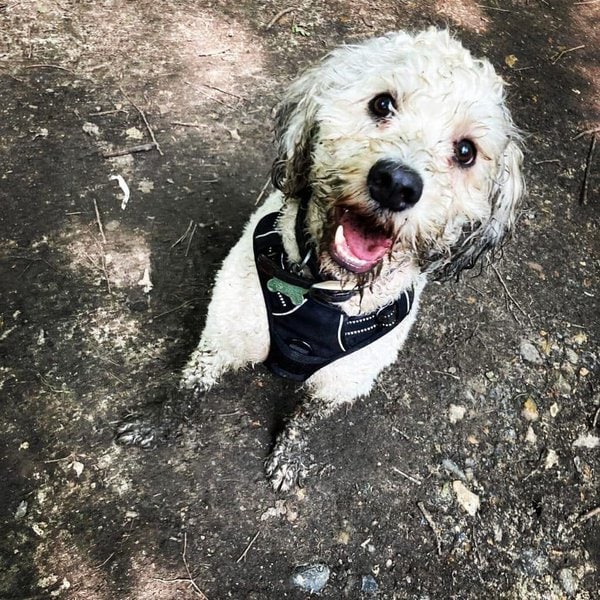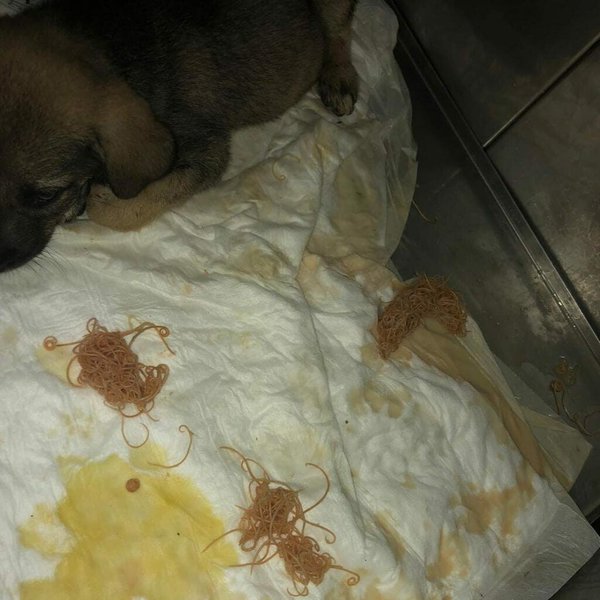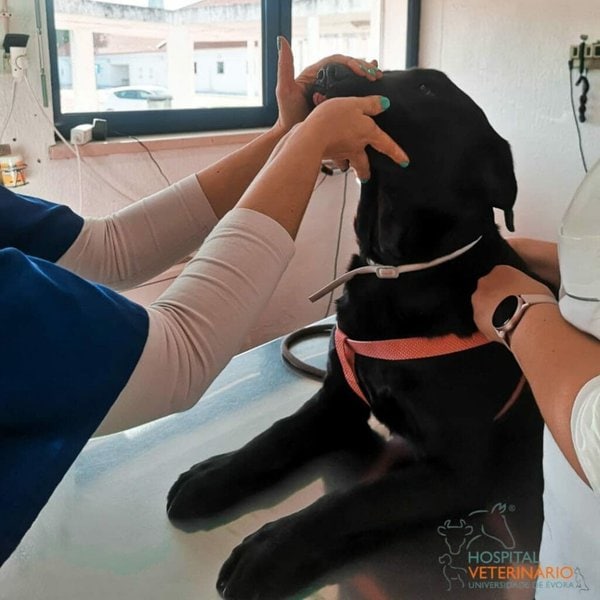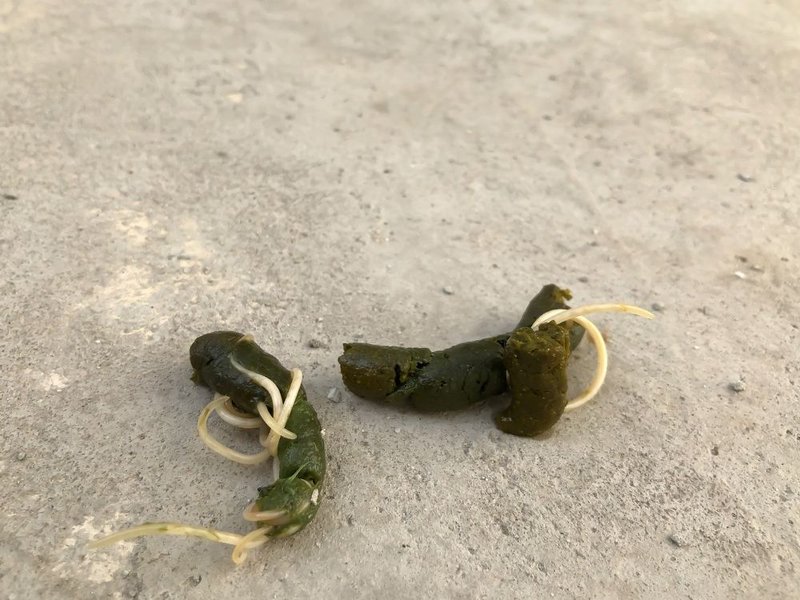Worms in dogs can be a real nuisance. Sadly, they’re all too common. Since your furry friend likes to explore the world with their mouth, they’re always susceptible to catching worms.
So how exactly do dogs get worms? The most common way for worms to get in is through your dog’s mouth. Typically, your curious canine will swallow worm eggs, after which the eggs will hatch and make themselves at home in your dog’s gastrointestinal tract.
If you’re a dog parent, chances are you probably inspect your dog’s poop every time you take them out. And there’s nothing more horrifying than finding little worms squiggling around in there. This is but one of the many symptoms that your dog has a serious worm infestation, the treatment for which is straightforward but lengthy. Before getting into the symptoms, treatments, and prevention for worms in dogs, let’s try to understand how a worm infestation starts.
How Does A Dog Get Worms?
If you see worms squiggling around in your dog’s poop, this means that they have worms living in their intestines. The most common causes for a worm infestation are eating infested soil, infected food, and, for puppies, nursing on an infected mother.
The problem is that worms are always hidden in plain sight, and they’re extremely elusive. So, your doggie might pick up these pesky parasites without you even realizing it. Here are a few ways how.
Eating Worm Larvae In Soil
Worms have the easiest access through your pooch’s curious muzzle, specifically their mouths. Unfortunately, the soil is often laden with worm eggs and larvae.
While worms live in your dog’s intestines, they lay eggs in ejected feces. These eggs can remain dormant in the soil for months, eventually causing the entire soil to become infested with worms. The problem gets worse when your dog eats up the soil and dirt in such condition.
Mother-Puppy Worm Transfer
Newborn pups can get roundworms and hookworms through their mother. If the mother has worms during her pregnancy, she can easily transfer them to her babies while they’re still in the womb. Additionally, young puppies can get worms through their mother’s milk.
Unfortunately, it is not safe to deworm pregnant dogs. In fact, you’ll have to wait until the puppies are at least two weeks old, after which you can put the whole family on deworming treatments.
Self-Grooming
Dogs love rolling around in grass and soil. To your furry friend, this is a common self-grooming technique to get rid of any debris or grime on their fur. Unfortunately, hookworms dwelling in infected soil can easily penetrate your dog’s skin.
Hookworms can just as easily penetrate the paws and belly – basically any skin that comes in contact with the ground.
Additionally, all that rolling around lets worm larvae and eggs hitch a ride on your dog’s fur. Your dog can potentially swallow those eggs while self-grooming, causing a worm infection.
Eating Infected Animals And Fleas
Dogs are natural-born hunters. If your canine companion likes to hunt or scavenge for food, he could catch worms by eating other worm-infected animals.
Worm eggs, especially tapeworms, thrive in raw meat. So, if your dog is on a raw meat diet, then there’s a small risk of a tapeworm infestation.
Moreover, your dogs may carry fleas, and those fleas may carry worm eggs and larvae. If your dog accidentally swallows a flea while trying to scratch itself, the worm eggs hatch and start developing inside their gastrointestinal tract.

What Are The Signs Of A Dog Having Worms?
The most typical signs of dogs having intestinal worms are:
- White worms in your dog’s feces
- Worms in your dog’s vomit
- Increased appetite
- Abnormally bloated stomach
- Scooting or scratching their rear in some other way
- Diarrhea, sometimes with blood
Unfortunately, not all worms exhibit the same symptoms. Even worse, some types of worms exhibit symptoms that are difficult to notice.
Types of Intestinal Worms In Dogs
Different types of worms can manifest different symptoms in your dog. There are four types of intestinal worms that may be distressing your four-legged pal:
- Tapeworms – The symptoms of having tapeworms are scooting and visible, rice-grain-sized worms in your dog’s poop.
- Roundworms – Roundworms are large, spaghetti-shaped worms that cause excessive vomiting. Sometimes, you can see roundworms in your dog’s vomit.
- Hookworms – A common symptom of hookworm infestation is pale gum.
- Whipworms – Whipworms induce diarrhea and weight loss in your dog.
The white worms squiggling around in your dog’s poop are either roundworms or segments of tapeworms. Other types of worms can be present in your dog’s poop, but they are often too small to see with the naked eye.
Do Worms Make Dogs Itch?
Excessive itchiness around the rear end is a potential sign of a worm infestation in your dog. However, worms don’t cause itchiness over your dog’s entire body. Instead, this is a sign of some other external parasite like fleas and ticks or a skin condition.
Dogs scoot to relieve irritation around their rear area. If your pooch is exhibiting scooting, it could be because of worms, specifically tapeworms.
Usually, intestinal worms exit through the anus to lay eggs around that area. These worms and eggs are visible to the naked eye. So, if your dog is particularly itchy around its butt, it could be because of tapeworms.
However, scooting can also be a sign of inflammation in the anal glands. Therefore, itchiness around the anal glands may not always and wholly be considered as the definite symptom of having worms.
Sometimes, itchiness all over the body can indicate a worm infection in other indirect ways. For example, fleas often carry tapeworm eggs. Fleas are also known to make your furry friend super itchy.
So, if your dog is feeling extra itchy because of fleas, it can be possible that they have a tapeworm infection. However, it is equally plausible that they don’t have any worm infestation at all. To reiterate, itching all over the body is not a direct symptom of worms.

How Do Dogs Get Rid Of Worms?
Dogs can not get rid of worms on their own. Instead, they require some sort of medical intervention to get rid of worms completely.
A Green Diet
You may have seen your dog chomping down on some grass or other plants. But they don’t gain any nutritional benefits from eating those leafy greens, so why do they do it?
It turns out that our canine companions inherited this habit from their non-domesticated ancestors. Out in the wild, canines would eat grass to purge their stomach from parasites, typically worms. The grass induces vomiting, which forces out some, but not all, of the worms dwelling in their stomach.
Other times, the grass also helps the dog pass their stool with more ease. This allows them to expel some of the worms through their feces.
However, worms are especially resilient; they latch onto the intestinal walls with an extremely strong grip. Even strong muscular contractions that occur with vomiting aren’t enough to make them let go.
Additionally, dogs can’t always force themselves to vomit and poop, no matter how much grass they eat. Moreover, excessive induced vomiting may damage your dog’s esophagus.
Therefore, don’t rely on your canine buddy to self-medicate by eating grass. If anything, the green diet is just a temporary relief from pain and irritation.
So, don’t sit around waiting for your pooch to purge out all of its worms. Not only is it not possible, but excessive vomiting and pooping can lead to severe dehydration or further health complications.
Worms Can Be Fatal
Certain cases of worm infestations can be fatal for your dogs. The likelihood of fatality depends upon your dog’s age, general health, and type of worms. But if you treat them timely, there’s no reason that your dog should succumb to a worm infestation.
Younger dogs, especially puppies, are at the highest risk of dying from an untreated worm infestation.
Unlike other intestinal worms, hookworms feed on your dog’s blood. This can lead to anemia, which can, in fact, be fatal for puppies.
Apart from intestinal worms, heartworms are also found to be fatal by causing damage to the organs. In addition, the treatment for heartworms can be expensive, and its side effects can be long-lasting and difficult to manage.
A typical worm infestation, however, shouldn’t be fatal. As long as you intervene quickly, your furry friend should be healthy in no time!

How Do You Get Rid Of Worms In Dogs?
The most effective way to get rid of worms in your dog is by using a deworming medicine as prescribed by your vet. While injectable dewormers do exist, oral dewormers are commonly used for canines.
Puppies are usually given a liquid dewormer since they can’t chew tablets. To make sure that they lick up every last drop, you have to mix in with their kibble.
Where Can You Get Deworming Medicine?
If you’re looking to buy deworming medicine for your dog, then it’s best to go to your vet. Vets determine the best medicine and dosage according to your dog’s breed, weight, age, and general health.
However, if you can’t make a visit to your vet, then you can purchase deworming medicine online. Although, try to keep this option as a last resort. Plus, always consult your vet before buying and administering a deworming medicine.
The best deworming medicine is one that targets multiple worms at once. In medical terminology, this is referred to as a “broad-spectrum” dewormer, meaning that one medicine can kill more than one intestinal worm type.
Is Deworming A Dog Expensive?
Deworming is a very common procedure, and deworming medicine is readily available in the market. Given how easy deworming medicine can be obtained, treating your dog for intestinal worms is not considerably expensive at all.
Generally, puppies require a smaller dose. For this reason, deworming your puppy will cost as low as $11 for each visit to the vet. However, this can add up over time since you absolutely must deworm your puppy once every month for a period of six months.
Conversely, larger dogs will require a higher dose, which means you can expect to spend up to $40 for each dose.
Make Sure Your Dog Doesn’t Vomit
If you decide to administer an oral dewormer by yourself, then you need to make sure that your dog doesn’t throw up the medicine.
Chewable tablets are often given to adult dogs. However, they may throw it up mere seconds after swallowing it, and you may not even notice it. This is why you should always let your vet give the dewormer, as they know how to force your dog to swallow the tablet.

What Are The Home Remedies For Deworming?
There are certain natural home remedies you can use to deworm your dog yourself. The best natural dog dewormers include apple cider vinegar, coconuts, turmeric, and kefir. While it is often cited as a good dewormer for dogs, garlic and garlic-based products can actually be extremely toxic.
Apple Cider Vinegar
Unlike pure synthetic vinegar, apple cider vinegar actually has an alkalizing effect inside the body. This alkaline environment becomes inhospitable for intestinal parasites, slowly poisoning and killing them.
What’s more, apple cider vinegar has proven to be more effective than synthetic dewormers, especially when intestinal worms develop a resistance to these synthetic drugs.
So, you can whip up a concoction for your canine companion using apple cider vinegar and a little bit of warm water. The amount of apple cider vinegar you will need to use can be anything in between ¼ to 1 teaspoon, depending on the size of your canine companion.
Turmeric
Turmeric is universally celebrated as a superfood, and, luckily, your furry friend can enjoy its benefits, too. In fact, this golden spice is often used in various commercial dog foods.
Turmeric has multiple natural pharmacological properties, one of which is its ability to kill intestinal worms in dogs.
Besides, turmeric can also help your canine companion in many ways, such as by boosting their immune system, improving their gastrointestinal health, and alleviating joint pains in senior dogs.
Dried Coconut Or Coconut Oil
Coconut is a little bit trickier than the other natural dewormers for dogs. Fresh coconut and coconut milk can have poisonous effects on your canine buddy. Therefore, using unsweetened dry coconut or coconut oil is highly recommended.
Still, too much coconut oil or dry coconut can lead to vomiting and diarrhea. Therefore, a safe dose is 1 tablespoon at most and lesser still for smaller breeds.
How Do You Administer Natural Dog Dewormers At Home?
Natural dog dewormers are only as effective as your administration. Getting the dosage right can be extremely tricky, which is why you should always consult with your vet. Based on your dog’s weight, age, and medical history, vets can best advise you on the proper dosage.
Another thing that people often get wrong is the time of administration. As a rule of thumb, you should never give your dog dewormers, natural or synthetic, on an empty stomach. Instead, the best time to give your dog a dewormer is either with their food or, at most, an hour after their last meal.

How Do You Know If Tapeworms Are Gone In Dogs?
Worm treatments start working about 2 to 6 hours after you have successfully administered the deworming medicine. However, it can take up to a few days for your dog to completely purge itself from these parasites.
The days following the deworming treatment are extremely crucial. As a responsible dog parent, it’s your job to keep an eagle eye on your beloved pooch. But what exactly are you looking out for?
How Do Dewormers Work?
Different dewormers function differently on parasites. Generally, dewormers kill the parasites, after which your dog will start pooping out the worms. After deworming, you can expect to see worms in your dog’s poop for up to a week.
Some dead worms may end up in your dog’s stomach, too. In this case, the dog will induce vomiting so that the worms can come out.
Other times, your dog may start digesting the dead worms, which can lead to diarrhea.
So, what you’re really looking for are signs of worms in your dog’s poop and vomit. These may be full or partial segments of the worms, and they may be dead or barely alive and moving.
Falling Back Into Routine
The one thing that will help your canine pal on his road to recovery is falling back into a routine. You should resume its walking, playing, and feeding schedules as soon as it can and as long as you’re keeping a close eye on them.
As far as feeding is concerned, dewormers are usually given alongside or, at most, an hour after your pup’s last feeding. So, you can feed your dog as you would on their regular feeding schedule. You can even feed your dog immediately after deworming.
However, keep in mind that your beloved pooch may not be up for eating, walking, or even playing for a few hours after deworming. But don’t worry, consequential loss of appetite and the subsequent loss of energy is a common but harmless side effect of deworming treatments.
Worm Eggs Are Trickier To Kill
Dewormers don’t have any effect on worm eggs, so there are probably hundreds of worm eggs inside and on your dog just waiting to hatch. If you don’t take the proper course of action after your dog’s deworming, you’re risking another worm infestation.
The most important thing you need to do is to follow up on your dog’s deworming. Usually, vets will schedule another deworming session two weeks after the first one. This follow-up treatment or subsequent treatments, should and will help ensure that any freshly hatched worms are also killed.
How Do I Prevent My Dog From Getting Worms Again?
The best way to prevent your dog from getting worms is by adopting good hygiene practices.
Training your dog not to eat things from the ground, giving them regular baths, controlling flea infestations, and routine vet visits should also help prevent another worm infestation.
Decontaminating Your House
After battling the worm infestation, the first thing on your agenda should be to decontaminate and disinfect your house.
The chances are that there are tens if not hundreds of worm eggs all over your house, and these eggs can survive for over two weeks. If your dog ingests these eggs, all your efforts will have been for nothing.
Even if your pooch has never had worms, you can still have traces of intestinal parasites all over your house. So, it is super important to clean your house regularly using an all-purpose cleaner.
Take special care of carpets and mats as shed fur can carry worm eggs. We recommend the iRobot Roomba i3+ as the ideal vacuum for cleaning the rugs. Its powerful suction helps getting rid of those stubborn pet hairs, while its automated features clean up after your pooches, thereby freeing up much of your time and making cleaning tasks effortless.
How Do You Prevent Worms In Dogs?
Prevention is always better than cure. Here is how you can help prevent your dog from getting worms again:
- Always clean up after your dog’s poop after they have finished their business outside. Feces are a breeding ground for worms. So, you’re only digging a deeper, worm-infested hole for yourself by not picking up your dog’s poop.
- Train your dog to not eat things off the ground, especially outside. You never know whether the food has worms or worm eggs on its surface.
- Give your furry friend regular baths, especially if they have rolled around in the grass or dirt outside. A thorough bath immediately after a rolling session will ensure that there are no parasites in your dog’s fur.
- If you have multiple pets, try to get them all dewormed at the same time. If you have a cat, make sure to decontaminate its litter regularly.
- Keep an eye out for fleas in your dog’s fur since they carry tapeworm eggs.
How Often Should You Deworm Your Dog?
Experts recommend that you deworm your dog once every month. If you want to push it, you can deworm them once every two months.
Puppies require more frequent deworming. After they are at least one month old, you need to deworm them once every month for a 6-month period.






